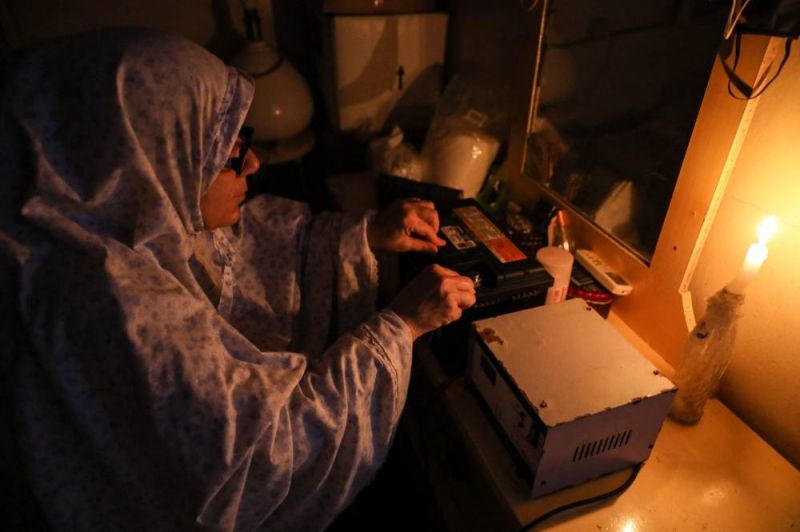
A woman in Beirut connects a battery to an electrical device by candlelight. (Credit: Anwar Amro/AFP)
Want to get the Morning Brief by email? Click here to sign up.
Electricity supply volatility persisted over the weekend, with two power plants briefly going offline before the arrival of fuel shipments. On Friday morning, Électricité du Liban announced that its two gas oil-powered plants, in Deir Ammar and Zahrani, had shut down because tankers waiting offshore had not been paid and fuel supplies had run out. By Saturday afternoon, the state power utility announced that the fuel tankers had received what they were owed and begun unloading, leading to a gradual increase in production at the plants. However, both EDL and generator power remains limited, with many homes and businesses without any source of electricity for several hours a day. The Health Ministry canceled its COVID-19 vaccine marathons and appointments scheduled for Saturday due to issues with power supply and internet reliability. The head of Rafik Hariri University Hospital, Firass Abiad, confirmed however that the temperature-sensitive vaccines were safe thanks to separate backup power systems for the fridges.
The Economy Ministry hiked bread prices again, citing the depreciation of the lira and increasing fuel costs. A small packet of bread, a staple for many families in Lebanon, rose by 14.7 percent per gram at supermarkets and shops to reach LL3,000 while the large packet increased by 5.4 percent to LL4,250. The bakeries’ union complained that as the value of the lira edges toward what would be a new record low of LL20,000 to the dollar, they are “incurring heavy burdens” to continue making and selling bread at what they described as a reasonable price.
Parliamentarians set themselves a 15-day deadline to decide whether to lift immunity from three MPs in the Beirut port explosion investigation as they await “more evidence.” The Parliament Secretariat and Administration and Justice Committee met at Speaker Nabih Berri’s residence in Ain al-Tineh on Friday to discuss Judge Tarek Bitar’s request to allow him to pursue former ministers and sitting MPs Ali Hassan Khalil, Ghazi Zeaiter and Nohad Machnouk for probable intent to murder and criminal negligence. Following the closed-door session, Deputy Speaker Elie Ferzli told reporters lawmakers were awaiting “all the necessary proof” from Bitar before reaching a final decision. Bitar’s predecessor at the head of the investigations, Fadi Sawwan, was forced to step down under political pressure after Zeaiter and Khalil refused to appear for questioning.
Meanwhile, families of victims of the Aug. 4 blast took to the streets to press for immunity to be lifted and justice for their loved ones to be served. Dozens of protesters gathered outside the Parliament speaker’s Ain al-Tineh residence as the MPs’ discussion took place Friday, only to be pushed back by the Lebanese Army. On Saturday, family members held a sit-in outside the homes of former Interior Minister Nohad Machnouk, one of those Bitar is seeking to question, and caretaker Interior Minister Mohamed Fehmi, who had rejected Bitar’s request to allow the interrogation of General Security head Abbas Ibrahim. Fehmi eventually agreed to meet the families, but a representative of the families said they were “not convinced” by his explanation. In nearly a year since the explosion, no one has been formally charged or held accountable.
An investigation has been launched into the death of 10-month-old Joury al-Sayyed, who died over the weekend. The family of the infant girl, who are from the Chouf village of Anout, said that they scoured pharmacies and hospitals for medicine to treat a high fever, but that they could not find any. However, the Mazboud Central Hospital said the girl had been treated there for lack of oxygen and septic shock, but she had been taken away in a private vehicle after a “decision out of the hospital’s control.” When the girl returned shortly afterward, she was suffering heart and lung failure and could not be saved, according to the hospital’s account. Both the Internal Security Forces and the Health Ministry have opened probes into her death.
Pharmacies went on strike over the weekend in protest at continued uncertainty surrounding the future of medicine subsidies. The association of pharmacy owners called for an open-ended strike after caretaker Health Minister Hamad Hassan failed to provide them with a detailed list of which medicines would continue to be subsidized by the central bank. Pharmacists told L’Orient Today they were divided between joining collective action to pressure the authorities into resolving the now monthslong medicine shortage and helping patients with what little supplies they had left. On Sunday afternoon, the association announced that it would partially suspend the strike — only selling medicines to those with a prescription signed by a doctor — after Hassan pledged to finally hand over a list. However, if they do not receive a list by Tuesday night, pharmacy owners warned they will close their doors again on Wednesday.